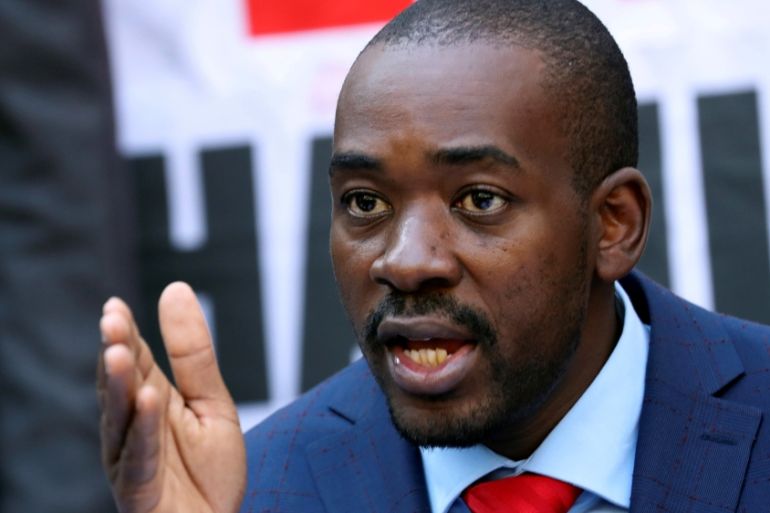Zimbabwe’s Chamisa rejects ruling on Mnangagwa’s election victory
Opposition leader Nelson Chamisa rejects ruling on election challenge, saying he has a legitimate claim to lead.

Zimbabwe’s main opposition leader Nelson Chamisa has rejected a court ruling that threw out his election challenge to Emmerson Mnangagwa’s election victory, saying he has a legitimate claim to lead.
Chamisa’s opposition group, the Movement for Democratic Change (MDC) Alliance, had brought the legal challenge saying that July 30’s vote was marred by “mammoth theft and fraud”.
Keep reading
list of 4 itemsFull jury panel seated on third day of Trump’s New York hush-money trial
Jacob Zuma’s nine lives: How South Africa’s ex-president keeps coming back
A flash flood and a quiet sale highlight India’s Sikkim’s hydro problems
“I have a legitimate claim that I should lead Zimbabwe,” Chamisa told reporters at a news conference in the capital Harare on Saturday.
The MCD president and MP took to Twitter on Friday, telling his supporters “I hear your cries and feel your pain. I know you feel cheated, but take heart – your victory is not lost.
“Your will is sacred and we’ll listen to you on the path of peace and course of action to be taken to rescue our beautiful Zimbabwe from the jaws of poverty, corruption and dishonesty.”
I hear your cries & feel your pain. I know you feel cheated, but take heart — your victory is not lost. Your will is sacred & we’ll listen to you on the path of peace & course of action to be taken to rescue our beautiful Zimbabwe from the jaws of poverty, corruption & dishonesty
— nelson chamisa🇿🇼 (@nelsonchamisa) August 24, 2018
Chief Justice Luke Malaba said on Friday that the MDC alliance had failed to prove fraud accusations during last month’s vote.
“The application is dismissed with costs … Emmerson Dambudzo Mnangagwa is duly declared the winner of the presidential elections held on the 30th of July 2018,” Malaba said in his ruling.
Mnangagwa, 75, said he was “not surprised by the court’s decision” and called for unity and peace.
“Nelson Chamisa, my door is open and my arms are outstretched, we are one nation, and we must put our nation first. Let us all now put our differences behind us. It is time to move forward together,” Mnangagwa wrote on Twitter shortly after the court announced its ruling.
The MDC’s legal challenge cited a catalogue of alleged discrepancies, including incorrect counting and fake polling stations, as well as instances at voting centres where there were more ballots cast than registered voters.
“There has been a massive doctoring of evidence,” Thabani Mpofu, a lawyer representing the MDC, told the top court when it started sitting on Wednesday.
Mnangagwa, of the ruling ZANU-PF party, won the election with 50.8 percent of the vote – just enough to pass the 50 percent threshold needed to avoid a runoff against Chamisa, who finished second with 44.3 percent.
European Union observers said that the ZANU-PF candidate had benefitted from an “un-level playing field” and some voter intimidation, though international monitors largely praised the conduct of the election.
The legal challenge delayed Mnangagwa’s planned inauguration for August 12. It will now take place on Sunday.